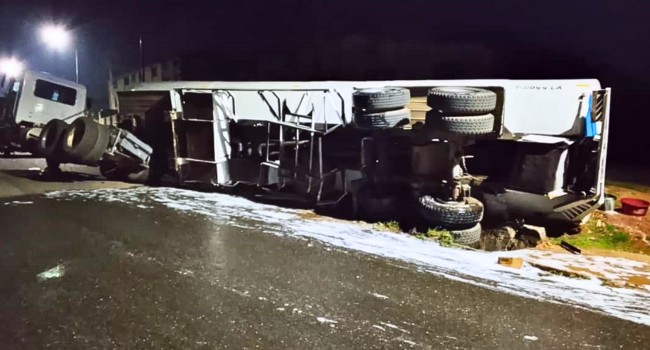A potential catastrophe was narrowly avoided in Ibadan on Tuesday night as Oyo State Fire Services raced against time to contain a petrol tanker spill opposite AIB Filling Station in the Eleyele area.
The incident involved a 45,000-litre PMS-loaded trailer tanker with registration number T21044LA, which veered off the road into a ditch, spilling fuel dangerously close to residential and commercial properties.
According to the Fire Services General Manager, Akinyemi Akinyinka, the emergency call came in at precisely 8:45 p.m. from a distressed resident, prompting an immediate dispatch of firemen to the scene.
Led by Chief Fire Superintendent Olayiwola, the crew arrived to find highly flammable liquid gushing uncontrollably from the overturned tanker.
Emergency responders deployed chemical foam compound to dampen the spillage, preventing ignition from nearby open flames or electrical sources.
READ ALSO:
- FALSE CLAIMS? Good Governance Advocates Defend Hon. Usman Kamfani – “He Did Not Accuse the House of Collecting ₦1–₦3m”
- Jigawa ranks best on fastest growing of IGR in North
- NASSI lauds Gov Namadi for supporting 600 women Tom Brown Producers
- Prime Initiatives urges CSOs to promotes poor’s needs in Budget
- Five Men In Dock Over Owo Church Massacre That Left 50 Worshippers Dead
The swift and coordinated intervention drew support from the Eleyele Police, Federal Road Safety Corps, and Amotekun Corps.
“Their prompt arrival and professionalism saved lives and properties,” Akinyinka confirmed.
The road was cleared by morning, with traffic and normal activities fully restored by dawn.
This latest incident follows a troubling pattern of petrol tanker accidents in the city.
Just two weeks earlier, a tanker explosion at Celica Junction damaged several vehicles but caused no fatalities.
In April, another fuel tanker burst into flames near the Lagos/Ibadan Tollgate, incinerating cars and homes.
Authorities have not yet commented on whether ageing infrastructure or reckless driving was to blame.
Residents have called for stricter monitoring of tanker movement within city limits to avert a future disaster.



